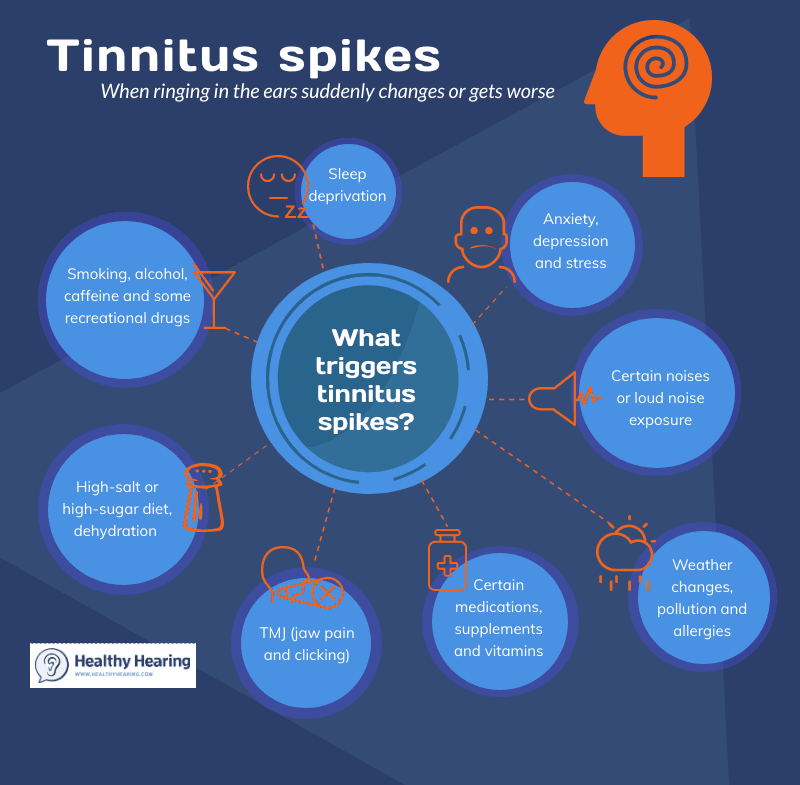|
www.HealthyHearing.com |
Ten travel tips for people with tinnitus
Contributed by Glenn Schweitzer When you live with bothersome tinnitus, routine travel experiences that were once easy, like road trips and long flights, can quickly become a big challenge. 
There are many aspects of traveling, whether by land, air, or sea, that can exacerbate a person’s tinnitus and cause unnecessary difficulties along the way. From jet lag, loud sounds, and airplane cabin pressurization to the junk food options available in airports and along major interstates, traveling with tinnitus can be fraught with obstacles. The good news is that with a little bit of planning and the right tools and strategies, you can avoid many of the common problems tinnitus sufferers face when going on a trip. Here are 10 helpful travel tips for tinnitus patients1. Hope for the best, but create an emergency tinnitus coping planDespite your best efforts, not every travel experience is going to go perfectly. Things can and will go wrong, and your best laid plans can fall apart for reasons entirely outside of your control. For tinnitus sufferers, sudden stressful events can cause unexpected tinnitus spikes, which can derail a vacation. Fortunately, a little bit of planning can go a long way. Tinnitus spikes, which include increases in volume, sound, intensity, or emotional reaction, can happen for a variety of reasons. Sometimes you can identify what causes your tinnitus to spike, other times you can’t. Regardless, tinnitus spikes are some the most difficult challenges that nearly all tinnitus patients face on a regular basis. 
diet changes, for example. The emotional reaction triggered by a bad tinnitus spike can be overwhelming. Fear and anxiety levels tend to rise quickly, and the coping tools that normally work well can lose some of their efficacy. The best strategy here is to educate yourself on the psychology of tinnitus spikes, and then come up with a coping plan that you can put into practice right away should a spike occur while traveling. Write down a list of coping tools and instructions that you can follow–that your family and friends can help you follow–as quickly as possible when a spike first starts. And most importantly, keep these tools and instructions with you at all times, as spikes can occur at any time of day or night. When your tinnitus is spiking, you can’t make the volume go down, but you can always make yourself more relaxed, calm, and comfortable. You can turn on more (or different) background noise for masking and take steps to try to distract yourself. The spike will pass eventually—they always do. The best thing you can do is calm yourself as much as possible to help it pass more quickly. 2. Minimize the effects of jet lagJet lag is a temporary but potentially stressful problem that occurs for a few days when first arriving in a different time zone. Your body maintains an internal day/night cycle called the circadian rhythm and when you suddenly end up in a new time zone, your circadian rhythm is still synced with the old time zone. As a result, many people experience a variety of temporary symptoms like sleeplessness, fatigue, trouble concentrating, mood changes, stomach issues, and a general feeling of being unwell. Jet lag and all its symptoms can trigger a person’s tinnitus to spike or make it more difficult to cope. Fortunately, there is a simple strategy that can minimize the effects of jet lag when traveling to a new time zone: taking melatonin to reset your circadian rhythm. (Always talk to your doctor before trying any new supplement or medication.) Melatonin is a hormone secreted in the brain that tells your body it’s nighttime and time to go to sleep. But melatonin is also available as an over the counter (or prescription) sleep aid in most countries, and if you take it at your normal bedtime adjusted for the new time zone, it can not only help you fall asleep more easily, it also can help alleviate jet lag by syncing your circadian rhythm to the new time zone much more quickly. 3. Use pressure-equalizing earplugs for flights and high-elevation drivesIf you’ve ever flown before or taken a drive in the mountains, you know that rapid changes in elevation can affect your ears. Airplane rides and ear pain are common. 
of pressure changes on the inner ear. Airplane cabins are usually pressurized to around 6,000-8,000 feet above sea level, while mountain roads can take you much higher. Depending on your starting elevation, it can add up to a significant and rapid change. Ear fullness, ear pain, and popping are commonly experienced when the atmospheric pressure changes rapidly because the pressure in your middle and inner ear doesn’t change as fast as the air pressure of the environment, causing the eardrum to swell inwards or outwards. This isn’t a trigger for everyone, but if your ears are sensitive to changes in elevation or barometric pressure, it can have a big effect on your tinnitus. (This is true even with weather changes, like springtime thunderstorms!) Fortunately, you can get a set of inexpensive pressure-equalizing earplugs that largely solve this problem by utilizing special filters to equalize the pressure more gradually.
4. Bring multiple hearing protection options for noisy environmentsEveryone should always protect their ears from loud sound exposure, but when you live with tinnitus, it’s of the upmost importance. If loud enough, sounds can damage your hearing and worsen your tinnitus permanently. But even if permanent damage doesn’t occur, loud sound exposure is one of the few universal triggers that will cause tinnitus spikes for just about every sufferer. If you know you are going to be in a loud environment, you can plan ahead and bring earplugs with you. But it’s also easy to suddenly find yourself in a noisy environment that you didn’t expect to encounter while traveling. The best strategy is to always keep two sets of earplugs on you while traveling: one pair of normal foam or silicone earplugs (for very loud environments) and one pair of high-fidelity musician’s earplugs (which lower the volume but still allow you to hear music and conversations clearly). This way, you are never caught unprepared.
Also, custom-fit earplugs are available from hearing care providers as well. These earplugs precisely fit into your ears. 5. Bring your own food and snacks on the airplane (or vehicle)For some reason, the food options available in most airports and along major interstates tend to be more of the junk food or fast-food variety. As a result, it can be hard to maintain your dietary needs by relying on what’s available around you. Not everyone’s tinnitus is triggered by dietary factors, but there are many common foods and/or macronutrients that can trigger tinnitus spikes for certain people. But even when dietary triggers are not a concern, if you are used to eating healthy, eating fast food or junk food can be hard on the body, adding physiological stress to the already stress-filled experience of traveling. There is a simple solution: Bring your own food and snacks with you! On road trips this may be obvious, but not everyone knows that you can bring food through airport security checkpoints. There are limits to this when traveling internationally–customs laws vary by country, and you may not be able to bring specific fruits, plants, or vegetables. But as a general rule, you can always take food through airport security. 6. Stop at the local grocery storeOnce you arrive at your destination, another helpful diet-related strategy is to stop by a local grocery store to purchase additional healthy food and snack options for the duration of your trip. The last thing you want when traveling is to have an unhealthy food or snack option trigger a spike, but hotel minibars are generally just stocked with candy and the little convenience stores you find in hotel lobbies are not much better. This can be easily avoided by stocking up on healthy snacks/food options at a local grocery store. Bonus tip: If you follow a specific diet to avoid dietary tinnitus triggers, like a low-sodium diet or a low-carb diet, you will likely find far more snack and food options that fit your diet at premium grocery stores like Whole Foods, Wegmans, Trader Joe’s, etc. 7. Research restaurant menusDepending on your destination, it can sometimes be difficult to maintain a specific type of diet when traveling, especially if you will be eating a lot of meals at restaurants. In the early days of my Meniere’s disease diagnosis—when my tinnitus was at its loudest—this was a huge challenge for me every trip. At the time, I maintained a strict low-sodium diet, so many types of restaurants were simply not an option for me. Finding a place to eat, especially when traveling with my family or friends, became a huge stressor for me. Fortunately, I figured out a simple solution that solved this problem entirely. Before every trip, I would spend time researching menus online to find the restaurants that would work best for me and my low-sodium diet, and then I would book reservations ahead of time. On the trip, I still allowed myself to find interesting and new restaurants, and I would often make last-minute changes. But having reservations already booked at places I knew I would enjoy always made traveling significantly more enjoyable. Bonus tip: Instead of only staying in hotels, if you rent a house or apartment with a kitchen, you have the option to cook your own meals! 8. Schedule time to rest and relax
especially if you have chronic tinnitus. When traveling, you are most likely going to be completely off of your normal routines and healthy habits that help you to cope with tinnitus and manage your stress levels. Stress is another universal tinnitus trigger that will often cause spikes. And while many travel experiences can be fun or relaxing, small stressors can still add up quickly. So regardless of the nature of your travel, or who you are traveling with, make sure to always prioritize self-care and schedule time to rest or relax whenever and however you can. This is very important, especially if you have been struggling to cope with your tinnitus prior to the trip. The added stress of travel can cause your tinnitus to spike and ruin part of your vacation. But you can help to prevent this by scheduling time to rest and relax along the way. Be sure to listen to white noise or something similar when falling asleep, as this can improve sleep and tinnitus and lead to fewer wake-ups. 9. Keep important medications and supplies with you at all timesWhen traveling, there are a lot of things that can go wrong. Bags get lost far more often than people realize in airports, plans change, and unexpected problems can and will arise. As a general rule, you should never put any important medications, supplements, or tinnitus-related supplies or tools in a checked bag or inaccessible suitcase. The last thing you want is to be stranded at your destination without your medications or supplies. When traveling to your destination, I always recommend that you keep all important medications and supplies with you and accessible at all times. 10. Prioritize sleepSleep deprivation is another universal trigger that causes tinnitus spikes. It’s a tricky one too because tinnitus can make it harder to fall asleep in the first place, creating a vicious cycle. To make matters worse, certain aspects of traveling can make it hard to fall asleep. For example, when sleeping in an unfamiliar place, research has shown that the left side of your brain remains somewhat alert and vigilant for the first night or two. It’s an evolutionary adaption that helped our prehistoric ancestors to survive, but in the modern age, it means that your sleep quality will be disrupted for the first night or two in any new environment. The best thing you can do is to prioritize and protect your sleep routines as much as possible while traveling. This means going to bed and waking at your normal hours and bringing everything you need with you to get a good night sleep. Things like sleep masks, a sound machine or Bluetooth speaker for masking, books and other pre-sleep relaxation routine items, and earplugs can all be helpful here. Even bringing your own pillow can help a lot, if it’s not too much of an inconvenience. See more in our article that includes 11 strategies to improve sleep with tinnitus. Final note: If you have tinnitus and hearing lossThese 10 tips above are tailored for anyone with tinnitus. But if you're one of the many people who have both tinnitus and hearing loss, be sure to check out our tips for traveling with hearing loss. Glenn Schweitzer
|
Featured clinics near me
Earzlink Hearing Care - Reynoldsburg
7668 Slate Ridge Blvd
Reynoldsburg, OH 43068

Find a clinic
We have more hearing clinic reviews than any other site!


 Glenn Schweitzer is an entrepreneur, blogger, and the author of Rewiring Tinnitus and Mind over Meniere’s. He is passionate about helping others who suffer from tinnitus and vestibular disorders and volunteers as an Ambassador Board Member for the Vestibular Disorders Association (VEDA). Through his blogs, he continues to raise awareness for tinnitus, Meniere’s disease, and other vestibular disorders, spreading his message of hope to those in need.
Glenn Schweitzer is an entrepreneur, blogger, and the author of Rewiring Tinnitus and Mind over Meniere’s. He is passionate about helping others who suffer from tinnitus and vestibular disorders and volunteers as an Ambassador Board Member for the Vestibular Disorders Association (VEDA). Through his blogs, he continues to raise awareness for tinnitus, Meniere’s disease, and other vestibular disorders, spreading his message of hope to those in need.